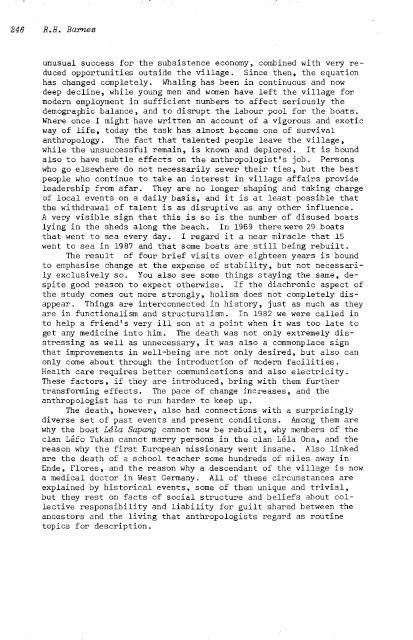CONTENTS NO.I - Institute of Social and Cultural Anthropology ...
CONTENTS NO.I - Institute of Social and Cultural Anthropology ...
CONTENTS NO.I - Institute of Social and Cultural Anthropology ...
Create successful ePaper yourself
Turn your PDF publications into a flip-book with our unique Google optimized e-Paper software.
246 R.H. Barnes<br />
unusual success for the subsistence economy, combined with very reduced<br />
opportunities outside the village. Since then, the equation<br />
has changed completely. Whaling has been in continuous <strong>and</strong> now<br />
deep decline, while young men <strong>and</strong> women have left the village for<br />
modern employment in sufficient numbers to affect seriously the<br />
demographic balance, <strong>and</strong> to disrupt the labour pool for the boats.<br />
Where once I might have written an account <strong>of</strong> a vigorous <strong>and</strong> exotic<br />
way <strong>of</strong> life, today the task has almost become one <strong>of</strong> survival<br />
anthropology. The fact that talented people leave the village,<br />
while the unsuccessful remain, is known <strong>and</strong> deplored. It is bound<br />
also to have subtle effects on the anthropologist's job. Persons<br />
who go elsewhere do not necessarily sever their ties, but the best<br />
people who continue to take an interest in village affairs provide<br />
leadership from afar. They are no longer shaping <strong>and</strong> taking charge<br />
<strong>of</strong> local events on a daily basis, <strong>and</strong> it is at least possible that<br />
the withdrawal <strong>of</strong> talent is as disruptive as any other influence.<br />
A very visible sign that this is so is the number <strong>of</strong> disused boats<br />
lying in the sheds along the beach. In 1969 there were 29 boats<br />
that went to sea every day. I regard it a near miracle that 15<br />
went to sea in 1987 <strong>and</strong> that some boats are still being rebuilt.<br />
The result <strong>of</strong> four brief visits over eighteen years is bound<br />
to emphasise change at the expense <strong>of</strong> stability, but not necessarily<br />
exclusively so. You also see some things staying the same, despite<br />
good reason to expect otherwise. If the diachronic aspect <strong>of</strong><br />
the study comes out more strongly, holism does not completely disappear.<br />
Things are interconnected in history, just as much as they<br />
are in functionalism <strong>and</strong> structuralism. In 1982 we were called in<br />
to help a friend's very ill son at a point when it was too late to<br />
get any medicine into him. The death was not only extremely disstressing<br />
as well as unnecessary, it was also a commonplace sign<br />
that improvements in well-being are not only desired, but also can<br />
only c'omeabout thrOugh the introduction <strong>of</strong> modern facilities.<br />
Health care requires better communications <strong>and</strong> also electricity.<br />
These factors, if they are introduced, bring with them further<br />
transforming effects. The pace <strong>of</strong> change increases, <strong>and</strong> the<br />
anthropologist has to run harder to keep up.<br />
The death, however, also had connections with a surprisingly<br />
diverse set <strong>of</strong> past events <strong>and</strong> present conditions. Among them are<br />
why the boat LJla Sapang cannot now be rebuilt, why members <strong>of</strong> the<br />
clan Lefo Tukan cannot marry persons in the clan Lela Dna, <strong>and</strong> the<br />
reason why the first European missionary went insane. Also linked<br />
are the death <strong>of</strong> a school teacher some hundreds <strong>of</strong> miles away in<br />
Ende, Flores, <strong>and</strong> the reason why a descendant <strong>of</strong> the village is now<br />
a medical doctor in West Germany. All <strong>of</strong> these circumstances are<br />
explained by historical events, some <strong>of</strong> them unique <strong>and</strong> trivial,<br />
but they rest on facts <strong>of</strong> social structure <strong>and</strong> beliefs about collective<br />
responsibility <strong>and</strong> liability for guilt shared between the<br />
ancestors <strong>and</strong> the living that anthropologists regard as routine<br />
topics for description.

















